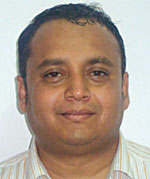|
Main Stories
‘Newspapers will continue to
serve the news-thirsty-society’ -says Pradip Das, asstt general manager, production dept, The Times of India, Ahmedabad. The importance of a newspaper in our lives cannot be undermined. We all look forward to the daily dose of our newspaper. A lot of efforts go in making of a newspaper – right from the reporting to the editing, to the production and the final delivery. Printing is undoubtedly one of the important production processes wherein perfect and timely printing is largely dependent upon its production staff. JR Chokshi (JRC), our resident representative recently met Pradip Das (PD), to know more about the challenges faced by a production staff. Excerpts.
PD: I have joined it by choice and with the help of my staff and superiors, have risen to this position and I really enjoy working in the newspaper press. I like to accept challenges and this is a job which is full of these. Besides, it is a pleasure to work in a dynamic organization like The Times of India, established in the year 1838 by Coleman, who was a printer and publisher and Bennett, who was the journalist. My destiny was in the print industry only. Had I not been in newspaper production, I would have been in similar kind of job profile in another print related industry. JRC: Which educational background you come from and how do you fit into the current responsibility? PD: I am BE Mechanical from Kolkata and have done Pipeline Eng. from IIT Mumbai and have done a correspondence course in printing (offset), besides a three-day course by RIND, Chennai. On completion of my studies, I joined Rollatainer, a packaging organization at Faridabad and then at Aircraft Co, Kolkata. My curiosity and desire to take up challenges brought me into newspaper production and landed in the Times of India press, Ahmedabad. I saw printing as a very wide field, with enough scope to develop if one has a desire and will for doing things and continue learning as and when opportunity comes. JRC: Can you share a few challenges you faced which jeopardized production and how did you overcome these? PD: There are always few issues in production of a newspaper and out of which some can be natural and certain may be on account of bottleneck in plant and machinery. Two of the most challenging instances had been when we tested the working of machine during day but when we actually started printing, a unit was not working and in-spite of all the attempts, we could not succeed. Ultimately, we had to take out a unit and curtail down the number of pages. Another incidence was when a part broke down during production and took long time to set it right, which forced us to divide production amongst two presses and ultimately met the demand. In all the incidences, spot decision and support from superiors worked successfully. JRC: Can you recollect an instance which has been most satisfying? PD: Devastating earthquake in 2001 in Gujarat is an incident I can never forget. Most of the colleagues got affected due to this incident. Our management decided to bring out edition in spite of being a holiday (January 26). It was a tough time, but all of us made the press rolling collectively and brought out the publication on the same day. It was the most satisfying achievement of my life. Team work is very important for successful functioning all the time. JRC: How do you rate importance of formally trained force v/s experienced one? PD: I rate trained workforce to be the utmost and experienced thereafter. Training guides the trainee fundamentally and with experience, a person can reach to any heights. Particularly in light of the latest trends and upgradation of technology training has much more value, but it ought to be a continuous process. JRC: How do you envisage the future of the newspapers? PD: I do not foresee any challenges to the newspaper industry and consider it as a never dying affair. Newspaper production is immortal and news in the form of newspaper will continue to serve the news-thirsty-society and satisfy the primordial needs of the human civilization. JRC: Are you able to devote the required time for your family amidst odd working hours? PD: If you balance your activities properly, you can successfully handle your work and family affairs. Besides, my family quite understands and is aware of my responsibilities. I like gardening and spend at least three to four hours in a week. I also love to read newspapers, books-technical as well as literature and philosophy. In-fact, each morning, a fresh newspaper gives me a sigh of relief as ‘Today’s newspaper has rolled out.’ JRC: What is your ultimate goal in life? PD: My ultimate goal is to make life better for the whole of our team and make them enthuse in their work. To see ‘PRINT’ – a word that makes an impact to each and every human life involved in printing profession in the form of: P- productivity, R- reliability, I- improvement in the environment by adopting ‘green print production process and technology,’ N- nurture the talent towards creativity for social benefit at large, and T- timely production and delivery. nnn
|
